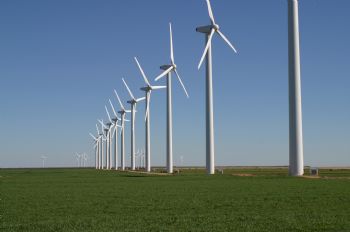
The Department of Energy and Climate Change (DECC) is to end all new subsidies for onshore wind farms in 2016, when it closes a renewable-energy support scheme. This is a year earlier than it announced before the General Election.
Energy Secretary Amber Rudd said that legislation is planned to legislate to end the Renewables Obligation (RO) subsidy scheme for new onshore wind farms from 1 April next year; after that, companies will have to compete for
a “strictly rationed” system of subsidies.
However, Ms Rudd said that up to 5.2GW of onshore wind capacity could be eligible for ‘grace’ periods offered to projects that already had planning consent, a National Grid connection and evidence of land rights.
The DECC said that the UK is already “well on the way” to meeting its climate-change targets. It pointed out that more than £800 million of subsidies had helped onshore wind to generate 5% of the UK’s total electricity in 2014, adding that “we want to help technologies stand on their own two feet, not encourage a reliance on public subsidies”.
Ms Rudd said: “We have a long-term plan to keep the lights on and our homes warm, power the economy with cleaner energy and keep bills as low as possible for hard-working families. Onshore wind is an important part of our energy mix, and we now have enough subsidised projects in the pipeline to meet our renewable-energy commitments”.
The Government is also changing the law to give local people the final say on planning applications for large wind farms, rather than the Energy Secretary, who previously had to approve schemes of more than 50MW.
Fergus Ewing, Scotland’s Energy Minister, said that the decision is “deeply regrettable”, adding that it will put at risk industry plans for large investment in onshore wind and will raise energy bills by forcing greater use of more
expensive forms of renewable power. He said: “We have warned Westminster that the decision, which appears irrational, may well be the subject of a Judicial Review.”
Some 5,500 onshore turbines have been built so far or are under construction, while another 3,000 have planning permission.